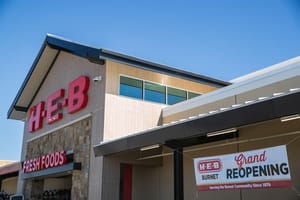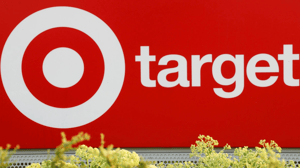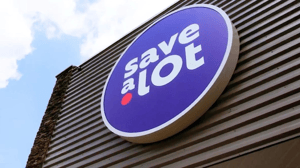Aldi Wants to Sell Groceries to 100 Million Americans by 2020Aldi Wants to Sell Groceries to 100 Million Americans by 2020
Company execs discuss hefty $5.3B cap-ex purse while pledging to 'keep it simple' for shoppers. The Lempert Report: During a tour of the retailer’s newly remodeled St. Charles, Ill., store, executives discussed Aldi's hefty cap-ex purse while pledging to stay true to its "keep it simple for shoppers" mantra.
August 9, 2018


Aldi executives gave a tour yesterday of the retailer’s newly remodeled St. Charles, Ill., store which they say represents how they are spending $5.3 billion to remodel their existing 1,800-plus stores and an additional 800 planned new locations.
The master plan is to use the investment to fulfill a vision of becoming the third-largest grocer by store count with more than 2,500 stores by 2022, putting them right behind Walmart and Kroger. The strategy includes expansion in more suburban middle and upper middle class neighborhoods.
The new format, which is 12,000-square-feet and is 20% larger than their previous footprint, has just five aisles, with expanded produce, refrigerated and freezer sections. Aldi executives said they’ve already expanded fresh food offerings by 40%.
Known for its low prices and signature private label foods and beverages for the past 40 years, Aldi seems to have a new focus, which is to expand beyond its core price-conscious customer to a much broader—dare I say?—more foodie-oriented shopper by touting its award-winning wines, Specially Selected brand of upscale foods, “fresh never frozen” seafood, organic meats, a Never Any brand of chicken (free from antibiotics, hormones, animal byproducts, steroids and salt, and fed a 100% vegetarian diet) and Earth Grown kale veggie burgers.
Execs Show and Tell During Store Tour
Aldi CEO Jason Hart, who led the store tour, said by the end of its five-year plan, the company wants to serve 100 million people. Hart declined to share specifics when asked about the number of in-store SKUs, how store sales have increased with the new format or additional insights on daily transactions.
Scott Patton and Joan Kavanaugh—both of whom have the title of VP of corporate buying—led our small group throughout the store, showcasing innovations in fresh, organic and on-trend offerings. Patton used its olive oil offerings as an example of how Aldi can satisfy just about every customer’s needs. Ten years ago, Patton said Aldi didn’t even carry olive oil. Today, it carries four SKUs: a basic olive oil that is the lowest price; an extra virgin; an organic; and Specially Selected olive oil, which is imported from a specific area in Sicily for the demanding palate.
Aldi’s assortment is made up of about 90% of their exclusive brands: SimplyNature, Earth Grown, Specially Selected, Never Any, LiveGFree (gluten free) and Little Journey (baby products), which, according to its test kitchen director, undergo more than 50,000 controlled tests to ensure that recipes and ingredients are strictly adhered to by suppliers. There is little doubt they are a demanding and strict buyer, but Aldi executives say they relish their long-term relationships with suppliers and think of them as partners for the long term.
Committed to the KISS Rule
Patton shared that their produce section, which by the way is very impressive both in quality and in price, is growing twice as fast as any other category in the store (although he would also not share any financial metrics). The department also includes a “Produce Picks” section that has a limited number of items. When I visited, the display was all about blueberries and strawberries at super low prices.
An interesting note is that unlike most grocers, the produce department is in the back of the store rather than up front, which is a tool most food retailers use to shout “fresh” and set the stage for a more enjoyable shopping trip with a vast array of colors and aromas.
“Aldi Finds” are 30 to 50 foods and beverages that are seasonal spot-buys that are in stores for just about a week. Aldi has another 30 to 50 products that are household and nonfood items, such as what was being offered during the tour—products such as carpets and drawers for student dorm rooms as they head back to college.
The Aldi executives reinforced over and over their aim to “keep it simple”—simple for the customer, by not inundating them with too many choices (after all, as Kavanaugh said, does a shopper really need dozens of choices of peanut butters?), and simple for their store and internal operations. When asked why they don’t do in-store sampling, the response was that it just adds cost to the system and they “want to keep it simple.”
About the Author
You May Also Like




